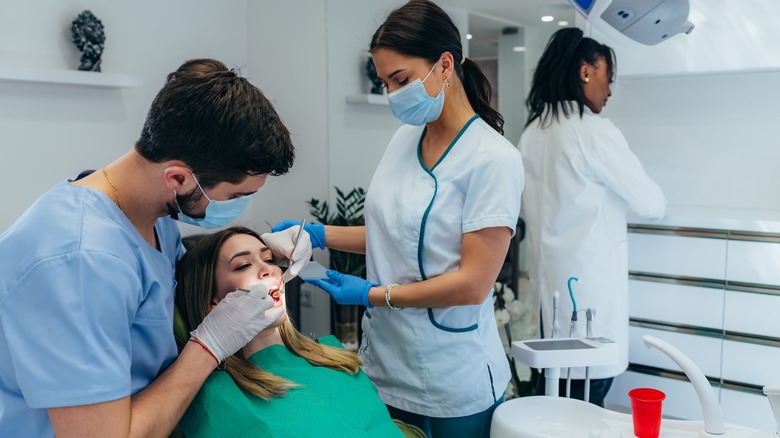Lupus is an autoimmune condition that affects 1.5 million people in the United States, with an estimated 16,000 new cases yearly, according to statistics from the Lupus Foundation of America. As a complex network of cells, tissues, and organs, the immune system’s job is to protect the body against harmful microorganisms, such as viruses, bacteria, and other pathogens. In a healthy body, the immune system can distinguish between its own cells and only attack foreign invaders. However, in people with lupus, the body begins to attack itself, per the Johns Hopkins Lupus Center. This leads to chronic inflammation and tissue damage and various other symptoms. In some cases, the mouth can also be affected, which presents various challenges to oral health.
If you have lupus, routine dental check-ups and cleanings are essential for maintaining good oral health and identifying potential problems early. If more uncomfortable oral symptoms are present, consult with your doctor for further treatment options.
The connection between lupus and oral health

A common oral manifestation of lupus is ulcers or sores, which can be painful and make it difficult to eat, drink, or speak. Oral ulcers in lupus are often small and red, with a white halo, or appear as a raised white bump, according to Lupus.net. They commonly occur on the mouth’s roof but may also be present on the lips, inside of the cheeks, and gums.
A 2024 study published in the journal International Journal of Environmental Research and Public Health notes that oral ulcers are more common in people who develop lupus at an early age and have a 45.5% prevalence in younger adults. According to the study, people with lupus are also at risk of developing gingivitis, which is inflammation of the gums. Gingivitis can cause swelling, bleeding, and tenderness of the gums. In severe cases, it can lead to periodontitis which is a more serious gum disease that can cause bone and tooth loss. Dry mouth can also occur in people with lupus who develop another autoimmune condition called “Sjögren’s syndrome.”
How to look after oral health with lupus

Maintaining good oral health is important for everyone, but it’s especially important for people with lupus. To ensure good oral hygiene, regular visits to the dentist will help. Let your dentist know that you have lupus, as this may affect your dental treatment and medication. Lupus.net recommends brushing the teeth twice a day. Regularly brushing your teeth helps remove plaque and prevent tooth decay and gum disease.
If you have mouth sores, it may help to use a soft-bristled brush to avoid further irritation. Treatment for oral sores or ulcers may involve topical or systemic medications, such as steroids or antimalarials, according to the Hospital of Special Surgery.
Dry mouth can increase the risk of tooth decay and gum disease. Drinking fluids in between meals is recommended to manage dry mouth as well as avoiding sugary food and drinks, per the National Health Service (NHS).




